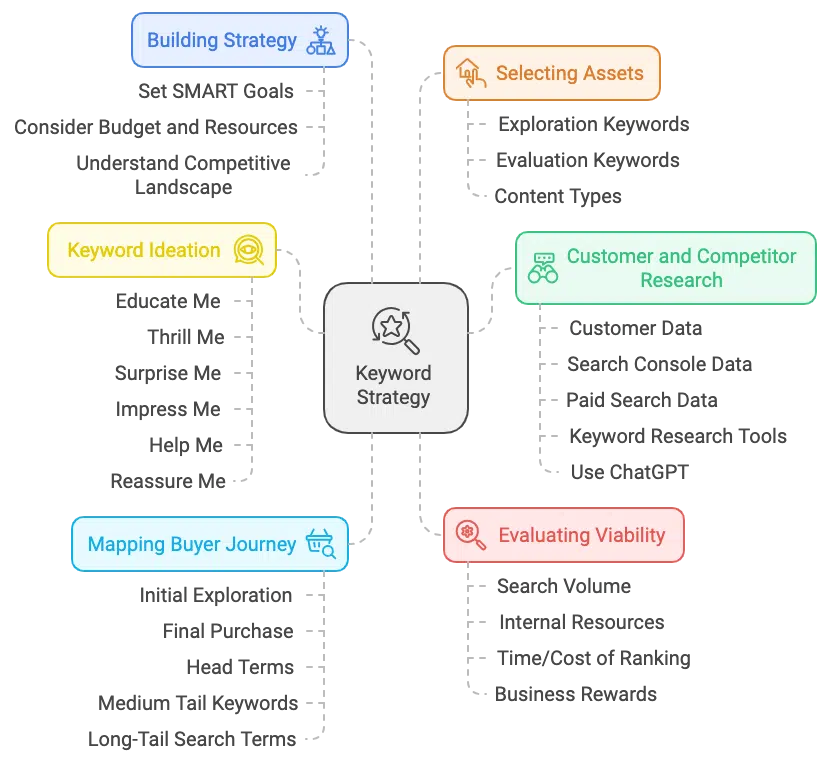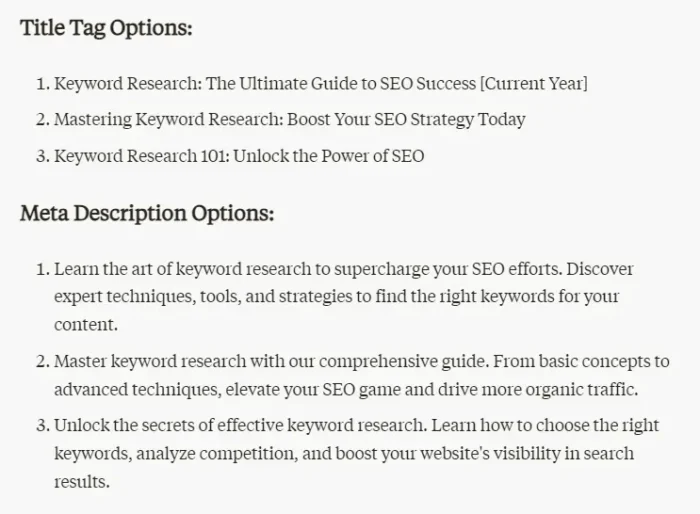Unlocking Online Visibility: The Indispensable Power of Keyword Research
Estimated reading time: 10 minutes
Key Takeaways
- In the digital landscape, visibility is paramount; without understanding audience search habits, valuable content can remain unseen.
- Keyword research is the foundational process of identifying terms people use in search engines, revealing what your target audience actively seeks. [Source: https://www.semrush.com/blog/keyword-research/], [Source: https://www.clearscope.io/blog/what-is-keyword-research-in-SEO], [Source: https://www.straightnorth.com/blog/keyword-research-importance/]
- Keyword research, **SEO**, and **digital marketing** are intrinsically linked, with keyword research bridging audience demand and content creation. [Source: https://www.clearscope.io/blog/what-is-keyword-research-in-SEO], [Source: https://www.straightnorth.com/blog/keyword-research-importance/]
- This guide systematically covers **keyword research**, a critical first step for a robust **content strategy** to maximize organic reach.
Table of Contents
- Unlocking Online Visibility: The Indispensable Power of Keyword Research
- Key Takeaways
- The Foundation of SEO: Understanding Keyword Research
- The Role of Keyword Research in a Comprehensive Content Strategy
- Practical Steps to Effective Keyword Research
- Integrating Keyword Research into Your SEO and Digital Marketing
- Beyond the Basics: Advanced Keyword Research Techniques
- Frequently Asked Questions
The Foundation of SEO: Understanding Keyword Research
In the vast expanse of the internet, simply publishing content isn’t enough. To truly connect with your audience and achieve your online goals, you need to understand *how* they search. This is where the critical practice of **keyword research** comes into play. It’s the meticulous process of identifying and analyzing the specific words, phrases, and even the questions that people type into search engines when they’re looking for information, products, or services. This detailed understanding allows content creators and marketers to craft material that precisely aligns with and directly addresses the needs and interests of their target audience.

The question then arises: *Why is this process so crucial for Search Engine Optimization (SEO)?* The answer lies in its fundamental role in optimizing your website for search engine algorithms. By conducting effective **keyword research**, you ensure that your content speaks the same language as your potential customers. This direct alignment with user search intent is paramount because it directly signals to search engines that your page is a relevant and valuable resource. Consequently, this leads to higher rankings in the Search Engine Results Pages (SERPs), making your content more discoverable by those actively seeking it.

Beyond just SEO, **keyword research** significantly informs and enhances broader **digital marketing** efforts. By identifying high-value keywords – those that attract relevant traffic and have a strong conversion potential – businesses can make more informed and efficient resource allocations. This means developing highly targeted marketing campaigns, whether for content creation, paid advertising, or social media, that resonate deeply with the intended audience. Ultimately, this strategic approach leads to a better Return on Investment (ROI) across all **digital marketing** initiatives, ensuring that your marketing spend is working as effectively as possible.
The Role of Keyword Research in a Comprehensive Content Strategy
At its core, **keyword research** is the bedrock upon which a successful and comprehensive **content strategy** is built. It’s not merely about finding popular terms; it’s about understanding the nuanced landscape of your audience’s needs and interests. This process directly dictates your content strategy by revealing the specific topics, questions, and pain points that are of paramount importance to your audience. This insight forms the essential foundation for all your editorial planning and content creation efforts, ensuring that every piece of content you produce has a clear purpose and a target audience in mind.

A critical aspect of this is the identification of *user intent*. To achieve genuine success online, your content must be precisely matched to what users are actively seeking. This means understanding whether their intent is informational (looking for answers), transactional (ready to buy), or navigational (trying to find a specific website). Aligning your content with this intent is increasingly critical for ensuring topical relevance, satisfying user queries, and ultimately driving higher audience engagement and conversion rates.
Furthermore, **keyword research** is instrumental in developing effective *topic clusters*. Once you’ve identified your core keywords and the user intents behind them, you can systematically build interconnected “clusters” of related content. This involves creating a central pillar page that covers a broad topic and then developing supporting articles that delve into specific sub-topics, all linking back to the pillar page and to each other. This practice not only helps to establish your website’s authority on a particular subject matter in the eyes of both users and search engines but also significantly enhances your overall **SEO** performance by creating a robust, interconnected web of relevant content.
Practical Steps to Effective Keyword Research
Embarking on effective keyword research might seem daunting, but by breaking it down into practical steps, it becomes a manageable and highly rewarding process. The journey typically begins with *brainstorming initial seed keywords*. This is where you start by listing the most basic, straightforward, and relevant terms directly associated with your business, products, services, or the general themes you intend to cover. These foundational terms, often broad in scope, are known as seed keywords and serve as the jumping-off point for deeper exploration.

Next, it’s crucial to leverage *keyword research tools*. There’s a wealth of specialized software designed to assist in this process, such as SEMrush, Ahrefs, and Google Keyword Planner. These tools are invaluable for generating a much wider array of keyword ideas based on your seed keywords, analyzing search trends to understand their popularity, and assessing the competitive landscape to gauge how difficult it might be to rank for them. While these tools offer extensive features, for the purpose of this guide, understanding their utility in expanding your keyword list and providing critical data is sufficient without delving into intricate tutorial details.

A vital part of the analysis involves *analyzing search volume and competition*. For each keyword you identify, it’s important to evaluate two key metrics. Search volume indicates the average number of times a particular keyword is searched for each month, giving you an idea of its potential reach. Competition, on the other hand, tells you how difficult it will be to rank for that keyword, often based on the authority and optimization of the websites already ranking for it. This dual analysis is crucial for informing your strategic prioritization, helping you to focus on keywords that offer a good balance of visibility and achievable ranking potential.

Understanding *long-tail keywords* is also essential for a comprehensive strategy. These are longer, more specific search phrases, often consisting of three or more words. For instance, instead of “shoes,” a long-tail keyword might be “waterproof trail running shoes for women.” The significant benefits of long-tail keywords are that they typically have much lower competition and attract highly targeted traffic. Users searching with these specific phrases are often further down the purchase funnel or have a very clear idea of what they need, making them exceptionally effective for reaching niche audiences and driving high-quality leads.

Finally, it’s important to focus on *identifying related keywords and synonyms*. To truly broaden your reach and ensure you’re covering all relevant search queries, you should actively search for and incorporate synonymous terms and semantically related keywords into your content. Search engines are increasingly sophisticated and understand the context and relationships between words. By using a variety of relevant terms, you significantly increase your content’s discoverability and relevance across a wider spectrum of user searches, capturing more potential visitors who might use slightly different phrasing.
Integrating Keyword Research into Your SEO and Digital Marketing
Once you’ve conducted thorough **keyword research**, the next critical step is to effectively integrate these insights into your practical **SEO** and broader **digital marketing** strategies. For **on-page SEO optimization**, the targeted keywords identified should be strategically woven into key elements of your web pages. This includes incorporating them naturally within headings (H1, H2, H3, etc.), meta descriptions, image alt text, and, most importantly, the body content itself. The goal is to signal relevance to search engines without keyword stuffing, ensuring your content is both search-engine friendly and highly readable for users.

The influence of **keyword research** extends beyond your own website into **off-page SEO considerations**. Keyword analysis can play a crucial role in shaping your external strategies. For example, understanding the keywords your target audience uses can guide the creation of optimized anchor text for backlinks you acquire. When other reputable sites link to yours, using anchor text that is relevant to your content and includes target keywords can significantly boost your authority and rankings. Furthermore, keyword insights can help identify relevant opportunities for guest posting on other blogs, ensuring your efforts are focused on platforms and topics that align with your target audience’s search behavior.

Perhaps most powerfully, the insights gleaned from meticulous **keyword research** can directly inform and enhance other **digital marketing** channels. This includes paid advertising (PPC) campaigns, where understanding popular and relevant keywords allows you to bid on terms that are likely to drive qualified traffic, thereby improving your ad spend efficiency. It also supports social media strategy development, helping you to identify trending topics and relevant hashtags that your audience engages with. Moreover, it can inform your promotional campaign messaging across all channels, ensuring that your communication is aligned with actual audience interests and search behaviors, leading to more impactful and successful campaigns overall.
Beyond the Basics: Advanced Keyword Research Techniques
While the foundational steps of keyword research are essential, there are advanced techniques that can provide a significant competitive edge. One highly effective method is *competitor keyword analysis*. This involves delving into the keywords for which your direct competitors are already ranking. By analyzing their top-performing keywords, you can uncover valuable keyword opportunities that you might have missed, identify content gaps on your own site, and gain inspiration for fresh, relevant content ideas that are proven to attract traffic within your niche.

Equally important is the practice of *monitoring keyword performance*. Keyword research is not a one-time task; it’s an ongoing process. Continuously tracking how your targeted keywords are performing over time – in terms of rankings, traffic, and conversions – is crucial. This data provides invaluable feedback. You can then use this information to adapt and refine your **content strategy**, identifying which keywords are delivering results and which may need more attention or a different approach. Staying on top of emerging trends and observed outcomes ensures your strategy remains dynamic and effective.

Finally, it’s imperative to acknowledge the constantly *evolving SEO landscape*. Search engine algorithms are not static; they are continuously updated, and user search behaviors change over time. What worked yesterday may not work tomorrow. Therefore, maintaining a commitment to ongoing **keyword research** is essential for staying competitive. By regularly revisiting your keyword strategy, adapting to new search trends, and understanding how user intent is shifting, you ensure that your **SEO** strategy remains aligned with the current realities of search and user expectations, preventing your website from becoming outdated or irrelevant.
Frequently Asked Questions
What is the primary goal of keyword research?
The primary goal is to identify and understand the terms and phrases your target audience uses when searching for information related to your business, products, or services. This understanding is crucial for creating content that meets their needs and for optimizing your website to be found by search engines.

How often should I perform keyword research?
While initial keyword research is foundational, it’s recommended to revisit and update your keyword strategy regularly. The frequency can vary, but performing a refresh at least quarterly or semi-annually is a good practice, especially to account for evolving search trends and competitor activities.
Can keyword research be done for free?
Yes, while paid tools offer more advanced features and data, you can conduct effective keyword research using free tools like Google Keyword Planner, Google Trends, and by analyzing search suggestions and “People Also Ask” sections within Google search results.

What’s the difference between short-tail and long-tail keywords?
Short-tail keywords are typically broad, 1-2 word terms (e.g., “marketing”). They have high search volume but also high competition and broader intent. Long-tail keywords are more specific, longer phrases (e.g., “best digital marketing strategies for small businesses”). They have lower search volume but less competition and much more specific user intent, often leading to higher conversion rates.
How does keyword research impact content creation?
Keyword research directly informs content creation by guiding the topics you cover, the specific questions you answer, and the language you use. By understanding what your audience is searching for, you can create highly relevant, valuable content that meets their needs and ranks well in search results.

Is keyword research still relevant in today’s SEO?
Absolutely. While SEO has evolved to focus more on user experience and topical authority, keyword research remains the fundamental starting point. Understanding search intent and user language is indispensable for creating content that satisfies both users and search engines effectively.






